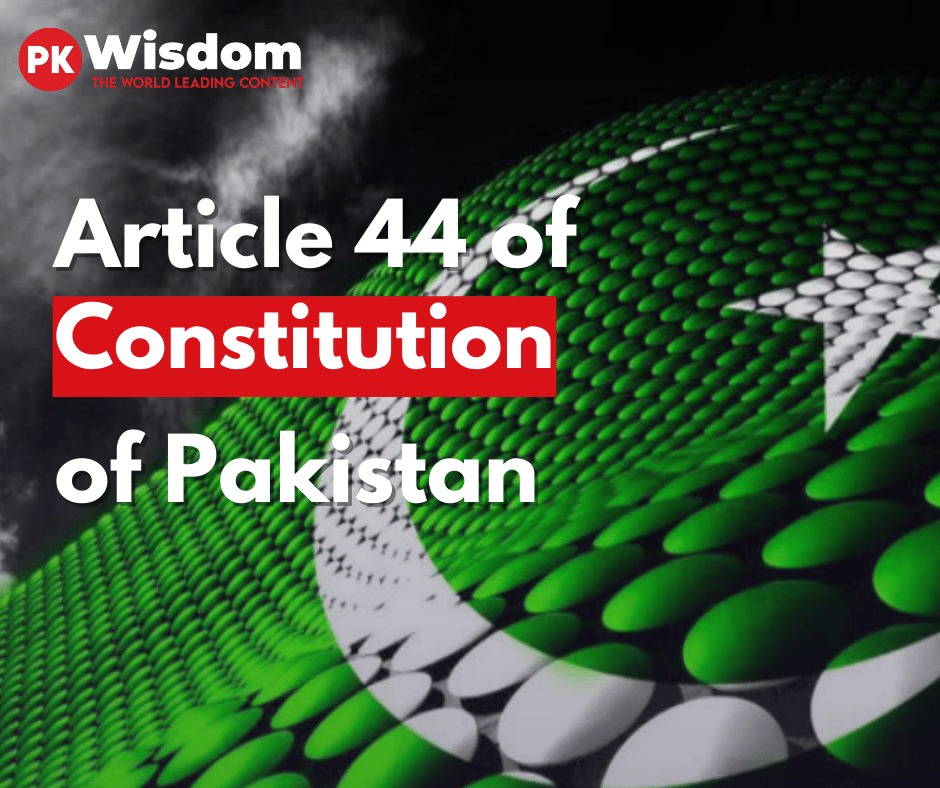Overview of Article 44 of the Constitution of Pakistan
The 1973 Constitution of Pakistan serves as the cornerstone of its governance, providing legal guidelines that protect democracy, rights and obligations within Pakistan’s society. Of particular note in this context is Article 44 which regulates the term of office for the President of Pakistan, we will explore its complexities here before exploring its role within Pakistan’s legal framework.
Article 44 States
44. Term of Office of President
- Subject to the Constitution, the President shall hold office for a term of five years from the day he enters upon his office:
Provided that the President shall, notwithstanding the expiration of his term, continue to hold office until his successor enters upon his office. - Subject to the Constitution, a person holding office as President shall be eligible for re-election to that office, but no person shall hold that office for more than two consecutive terms.
- The President may, by writing under his hand addressed to the Speaker of the National Assembly, resign his office.
The first clause stipulates the duration of the President’s term in office, which is five years from the day they assume the presidency. Furthermore, it ensures that the President continues in office until the newly elected President assumes office.
The second part addresses the potential for re-election. It allows a person currently serving as President to seek re-election. However, it imposes a restriction: no individual can hold the office of President for more than two consecutive terms, emphasizing the importance of leadership rotation.
The third provision outlines the procedure for the President to resign from office. It involves the President submitting a written resignation to the Speaker of the National Assembly, resulting in the termination of their presidential term.
Key Points of Article 44 of the Constitution of Pakistan
To grasp the significance of Article 44, let’s delve into its key points:
- Fixed Presidential Term: The first provision establishes a fixed term of five years for the President. This duration allows for continuity in leadership while maintaining regular opportunities for change.
- Continuity until Successor’s Entry: The provision ensures that even if the President’s term expires before a successor is elected, the incumbent President will continue in office until the new President takes office. This guarantees a seamless transition of power.
- Term Limits and Re-Election: The second part permits a President to seek re-election, contributing to democratic choice. However, the restriction on holding the office for more than two consecutive terms maintains the importance of leadership turnover.
- Resignation Mechanism: The third provision offers a straightforward method for the President to resign, reinforcing the principles of individual choice and personal integrity in leadership.
Download the Constitution of Pakistan in PDF
Crux of Article 44 of the Constitution of Pakistan
At its core, Article 44 serves several pivotal purposes:
- Preserving Democratic Continuity: By defining a fixed term, the article ensures that the nation’s leadership remains stable for five years, permitting the implementation of policies and continuity in governance.
- Transition of Power: The provision that allows the incumbent President to remain in office until the successor’s entry prevents power vacuums and assures a smooth transition of authority.
- Democratic Accountability: The limit on consecutive terms promotes democratic accountability, as it fosters competition and the possibility of fresh leadership with new ideas and perspectives.
- Respect for Personal Choice: The inclusion of a resignation mechanism respects the President’s right to make a personal choice regarding their continued tenure.
Conclusion: Article 44 of the Constitution of Pakistan
In conclusion, Article 44 of the 1973 Constitution of Pakistan is a fundamental element of the nation’s constitutional framework. It regulates the term of office for the President, encourages democratic continuity, and ensures a balance between leadership stability and leadership change. It also upholds democratic values by limiting consecutive terms and allowing the President the option to resign.
The Constitution of Pakistan plays an instrumental role in shaping its political landscape, with Article 44 being one of its central tenets. For legal scholars, concerned citizens, or anyone interested in its details – it serves as an anchorstone that defines democratic principles and governance structures throughout Pakistan.


